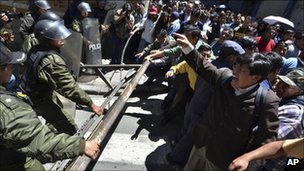 Bolivian President Evo Morales has suspended work on a highway being built in the Amazon, amid a national furore over the way opposition to the road has been handled.
Bolivian President Evo Morales has suspended work on a highway being built in the Amazon, amid a national furore over the way opposition to the road has been handled.
On Sunday police fired tear gas and rounded up hundreds of activists staging a march against the road.
A minister quit in protest and Mr Morales condemned the action when he announced the project's suspension.
He now says he will allow local regions to decide on the future of the road.
"There needs to be a national debate so the two provinces [Cochabamba and Beni] involved in this can decide... In the meantime the project is suspended," said Mr Morales, according to Reuters news agency.
He did not specify how the two provinces would decide, but on Sunday he said a referendum could be held - though government sources say this could take six months or more to organise.
The issue triggered anti-government protests in Cochabamba, Beni and La Paz - where thousands of protesters, mainly college students, gathered around the Quemado government palace.
Barricades
The proposed 300km (190-mile) road, financed by Brazil, would link Brazil to Pacific ports in Chile and Peru.
Mr Morales says the road is essential for Bolivia's development, but it will run through a rainforest preserve and its construction is bitterly opposed by indigenous inhabitants.
About 1,000 protesters were staging a 500km march on the main city La Paz when they were stopped by riot police on Sunday in the Yucumo region.
Police forced protesters on to buses, but hundreds of local people lit fires on the roads, forcing authorities to detour to the airport in the Amazon town of Rurrenabaque.
But residents there blocked the runway with flaming tyres and barricades and police were forced to free the detainees.
Protesters complain that "extreme violence" was used when police surged into the demonstrators' camp.
They say an infant was killed and that some protesters remain missing - allegations denied by Interior Minister Sacha Llorenti, who claimed the police action was aimed at preventing clashes with pro-government groups who were approaching to try to halt the march.
But this explanation has been brushed off by protesters.
"We don't understand why the government has acted in this brutal manner," Rafael Quispe, one of the protest leaders, told AFP.
"This is a government that says it is of the indigenous people, yet it has attacked them."



